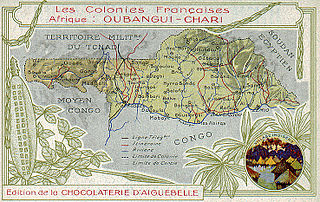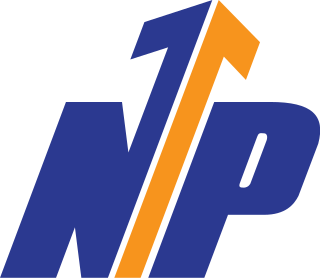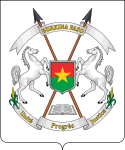
The Central African Republic is a landlocked country in Central Africa. It is bordered by Chad to the north, Sudan to the northeast, South Sudan to the southeast, the Democratic Republic of the Congo to the south, the Republic of the Congo to the southwest, and Cameroon to the west.

The history of the Central African Republic is roughly composed of four distinct periods. The earliest period of settlement began around 10,000 years ago when nomadic people first began to settle, farm and fish in the region. The next period began around 10,000 years prior.

Gabon, officially the Gabonese Republic, is a country on the west coast of Central Africa. Located on the equator, it is bordered by Equatorial Guinea to the northwest, Cameroon to the north, the Republic of the Congo on the east and south, and the Gulf of Guinea to the west. It has an area of nearly 270,000 square kilometres (100,000 sq mi) and its population is estimated at 2.3 million people. There are coastal plains, mountains, and a savanna in the east.

The Democratic Republic of the Congo (DRC) is a country in Central Africa bordered to the west by the South Atlantic Ocean. By land area, the DRC is the second-largest country in Africa and the 11th-largest in the world. With a population of around 108 million, the Democratic Republic of the Congo is the most populous officially Francophone country in the world. The national capital and largest city is Kinshasa, which is also the nation's economic center. The country is bordered by the Republic of the Congo, Central African Republic, South Sudan, Uganda, Rwanda, Burundi, Tanzania, Zambia, Angola, and the Cabinda exclave of Angola.
An electoral college is a set of electors who are selected to elect a candidate to particular offices. Often these represent different organizations, political parties or entities, with each organization, political party or entity represented by a particular number of electors or with votes weighted in a particular way.

François Bozizé Yangouvonda is a Central African politician who was President of the Central African Republic from 2003 to 2013.

The president of South Africa is the head of state and head of government of the Republic of South Africa. The president heads the executive branch of the Government of South Africa and is the commander-in-chief of the South African National Defence Force. Between 1961 and 1994, the office of head of state was the state presidency.

The Parliament of the Republic of South Africa is South Africa's legislature; under the present Constitution of South Africa, the bicameral Parliament comprises a National Assembly and a National Council of Provinces. The current twenty-seventh Parliament was first convened on 22 May 2019.

The National Party, also known as the Nationalist Party, was a political party in South Africa founded in 1914 and disbanded in 1997. The party was an Afrikaner ethnic nationalist party that promoted Afrikaner interests in South Africa. However, in 1990 it became a South African civic nationalist party seeking to represent all South Africans. It first became the governing party of the country in 1924. It merged with its rival, the SAP, during the Great Depression, and a splinter faction became the official opposition during World War II and returned to power and governed South Africa from 4 June 1948 until 9 May 1994.

National-level elections in Italy are called periodically to form a parliament consisting of two houses: the Chamber of Deputies with 400 members; and the Senate of the Republic with 200 elected members, plus a few appointed senators for life. Italy is a parliamentary republic: the President of the Republic is elected for a seven-year term by the two houses of Parliament in joint session, together with special electors appointed by the Regional Councils.

The unicameral National Assembly is Niger's legislative body. The National Assembly may propose laws and is required to approve all legislation.

The People's Republic of Angola was the self-declared socialist state which governed Angola from its independence in 1975 until 25 August 1992, during the Angolan Civil War.

The following outline is provided as an overview of and topical guide to the Republic of the Congo:

The Republic of the Congo, also known as Congo-Brazzaville, the Congo Republic or simply either Congo or the Congo, is a country located on the western coast of Central Africa to the west of the Congo River. It is bordered to the west by Gabon, to its northwest by Cameroon and its northeast by the Central African Republic, to the southeast by the Democratic Republic of the Congo, to its south by the Angolan exclave of Cabinda and to its southwest by the Atlantic Ocean.

General elections were held in the Central African Republic on 27 December 2020 to elect the President and National Assembly. A second round of the legislative elections was originally scheduled to take place on 14 February 2021.

The 1987 Transkei coup d'état was a bloodless military coup in Transkei, an unrecognised state and a nominally independent South African homeland for the Xhosa people, which took place on 30 December 1987. The coup was led by the then 32-year-old Major General Bantu Holomisa, the Chief of the Transkei Defence Force, against the government of Prime Minister Stella Sigcau (TNIP). Holomisa suspended the civilian constitution and refused South Africa's repeated demands for a return to civilian rule on the grounds that a civilian government would be a puppet controlled by Pretoria.

This national electoral calendar for 2023 lists the national/federal elections held, and scheduled to be held, in 2023 in all sovereign states and their dependent territories. By-elections are excluded, though national referendums are included. Specific dates are given where these are known.

The 1990 Ciskei coup d'état was a bloodless military coup in Ciskei, an unrecognised state and a nominally independent South African homeland for the Xhosa people, which took place on 4 March 1990. The coup was led by the then 37-year-old Brigadier Oupa Gqozo, the Chief of Staff Intelligence of the Ciskei Defence Force, against the government of President for Life Lennox Sebe (CNIP), who was on a state visit to Hong Kong at the time. The coup was followed by widespread rioting and looting, prompting Gqozo to request that the South African government send SADF troops to help restore order.

The 1990 Venda coup d'état was a bloodless military coup in Venda, an unrecognised state and a nominally independent South African homeland for the Venda people, which took place on 5 April 1990. The coup was led by the then 48-year-old Colonel Gabriel Ramushwana, the Chief of Staff of the Venda Defence Force, against the government of President Frank Ravele (NPV).

















